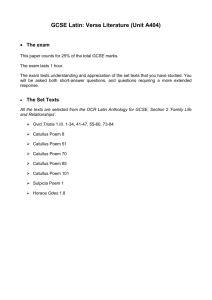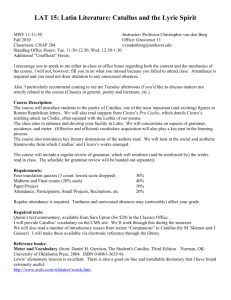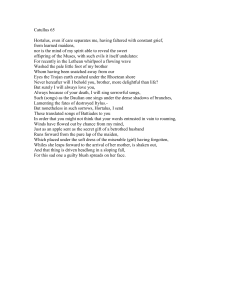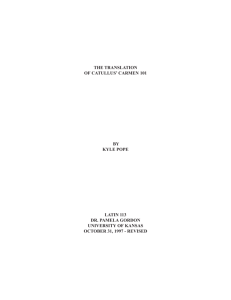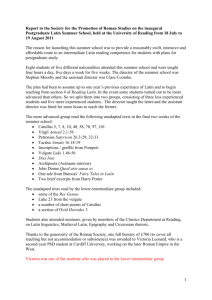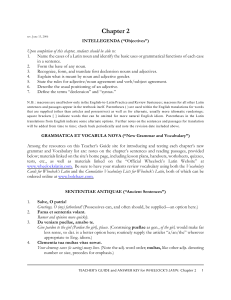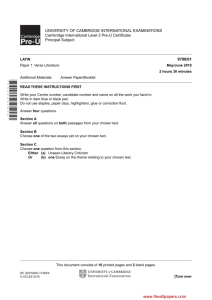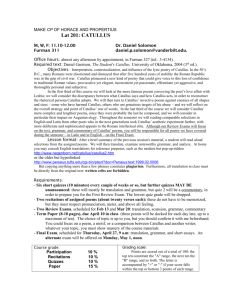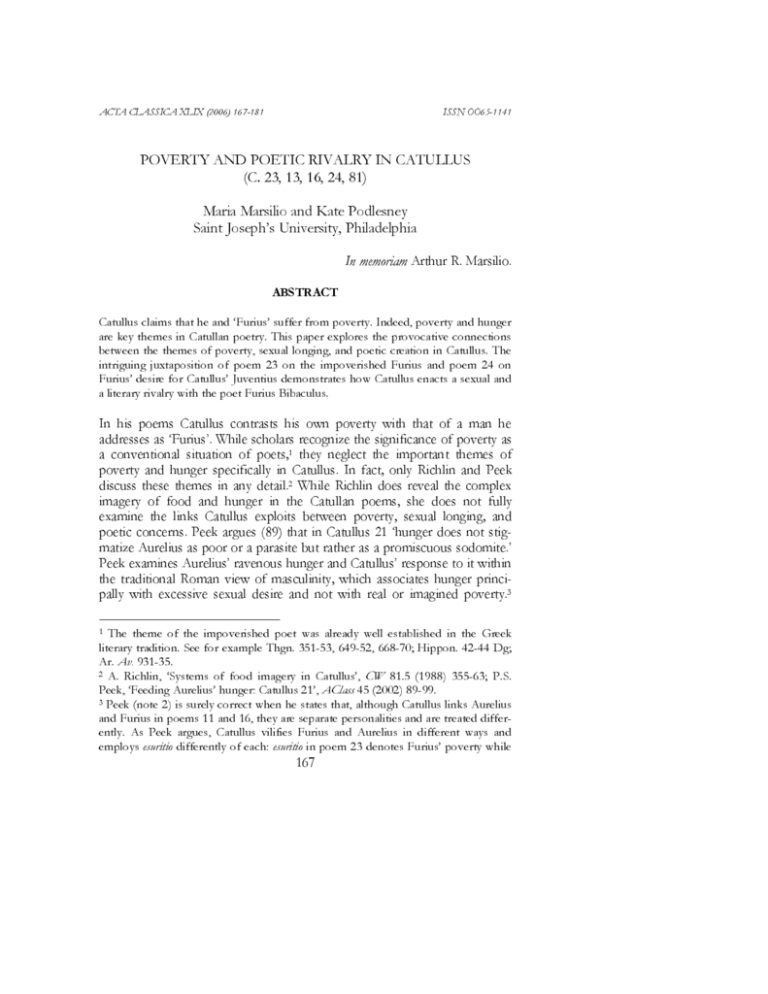
ACTA CLASSICA XLIX (2006) 167-181
ISSN OO65-1141
POVERTY AND POETIC RIVALRY IN CATULLUS
(C. 23, 13, 16, 24, 81)
Maria Marsilio and Kate Podlesney
Saint Joseph’s University, Philadelphia
In memoriam Arthur R. Marsilio.
ABSTRACT
Catullus claims that he and ‘Furius’ suffer from poverty. Indeed, poverty and hunger
are key themes in Catullan poetry. This paper explores the provocative connections
between the themes of poverty, sexual longing, and poetic creation in Catullus. The
intriguing juxtaposition of poem 23 on the impoverished Furius and poem 24 on
Furius’ desire for Catullus’ Juventius demonstrates how Catullus enacts a sexual and
a literary rivalry with the poet Furius Bibaculus.
In his poems Catullus contrasts his own poverty with that of a man he
addresses as ‘Furius’. While scholars recognize the significance of poverty as
a conventional situation of poets,1 they neglect the important themes of
poverty and hunger specifically in Catullus. In fact, only Richlin and Peek
discuss these themes in any detail.2 While Richlin does reveal the complex
imagery of food and hunger in the Catullan poems, she does not fully
examine the links Catullus exploits between poverty, sexual longing, and
poetic concerns. Peek argues (89) that in Catullus 21 ‘hunger does not stigmatize Aurelius as poor or a parasite but rather as a promiscuous sodomite.’
Peek examines Aurelius’ ravenous hunger and Catullus’ response to it within
the traditional Roman view of masculinity, which associates hunger principally with excessive sexual desire and not with real or imagined poverty.3
The theme of the impoverished poet was already well established in the Greek
literary tradition. See for example Thgn. 351-53, 649-52, 668-70; Hippon. 42-44 Dg;
Ar. Av. 931-35.
2 A. Richlin, ‘Systems of food imagery in Catullus’, CW 81.5 (1988) 355-63; P.S.
Peek, ‘Feeding Aurelius’ hunger: Catullus 21’, AClass 45 (2002) 89-99.
3 Peek (note 2) is surely correct when he states that, although Catullus links Aurelius
and Furius in poems 11 and 16, they are separate personalities and are treated differently. As Peek argues, Catullus vilifies Furius and Aurelius in different ways and
employs esuritio differently of each: esuritio in poem 23 denotes Furius’ poverty while
1
167
This paper intends to advance the understanding of the themes of poverty,
sexual desire, and poetic creation and their interrelationship in Catullus’
poems and to shed light upon the problematic identity of Catullus’ Furius
and Catullus’ relationship to him.
No critical consensus resolves whether Catullus’ Furius can be identified
as Furius Bibaculus or Furius ‘Alpinus’. Furius may have been the author of
an epic poem as well as a writer of invectives and epigrams. Scholiasts identify the contemporary poet whom Horace accuses of bombast (Serm. 2.5.4041; nicknamed ‘Alpinus’ in Serm. 1.10.36) as Furius Bibaculus, the author of
an epic poem on the Gallic War. Rudd thinks Furius Bibaculus and Furius
‘Alpinus’ are two different people, for a neoteric poet such as Bibaculus is
not likely to have composed a historical epic as ‘Alpinus’ supposedly did.4
Based on the testimony of ancient sources, however, Lyne does identify
Furius Bibaculus with the epic poet Furius ‘Alpinus’, although he separates
Furius Bibaculus from the neoteric movement.5 If Rudd is correct that there
are two poets named Furius, then Jerome’s date of 103 BC must belong to
the epic poet Furius ‘Alpinus’ and not to Furius Bibaculus whom many connect to the neoteric movement. However, if Furius Bibaculus is the same
person as Furius ‘Alpinus’ and is also a member of the circle of poetae novi,
then we must assume that Jerome’s date of 103 BC is about twenty years too
early. Courtney soundly concludes that ‘there are no grounds for supposing
that Jerome has confused two Furii, one born in 103 and the younger
Bibaculus, and for attributing the Annales Belli Gallici to the elder on the
supposition that Porphyrio and [Acro] have fallen into the same confusion.’6
In what follows we argue that Bibaculus and ‘Alpinus’ are the same person,
and that Bibaculus was both a writer of epigram in the manner of the poetae
novi and a writer of epic in the traditional Homeric and Ennian style.7
in poem 21 it denotes Aurelius’ carnal desire and not his poverty. On the connection
of hunger and lust in poem 21, see also D. Konstan, ‘An interpretation of Catullus
21’, in C. Deroux (ed.), Studies in Latin Literature and Roman History (Brussels 1979)
214-16; and W. Fitzgerald, Catullan Provocations: Lyric Poetry and the Drama of Position
(Berkeley, Los Angeles & London 1995) 65.
4 N. Rudd, The Satires of Horace (Cambridge 1966) 289.
5 R.O.A.M Lyne, ‘The Neoteric poets’, CQ 28 (1978) 171 n. 13.
6 E. Courtney, The Fragmentary Latin Poets (Oxford 1993) 200.
7 In agreement are A.L. Wheeler, Catullus and the Traditions of Ancient Poetry (Berkeley,
Los Angeles, & London 1934) 78 and 258 n. 45; and Courtney (note 6) 200. Courtney states: ‘We should think of Bibaculus as one on the fringes of the “new” poets;
his oeuvre does not include that mark of the thorough Callimachean, a miniature epic,
and Horace calls him pingui tentus omaso, which means that he was pacuv~, in the
Callimachean code the opposite of leptov~.’
168
Furthermore, important clues in Catullus’ poems 16, 23, 24 and 81 identify
Catullus’ Furius as Furius Bibaculus.
In poem 23, Catullus attacks Furius as a man without material possessions:
5
10
15
20
25
5
Furi, cui neque servus est neque arca
nec cimex neque araneus neque ignis,
verum est et pater et noverca, quorum
dentes vel silicem comesse possunt,
est pulcre tibi cum tuo parente
et cum coniuge lignea parentis.
nec mirum: bene nam valetis omnes,
pulcre concoquitis, nihil timetis,
non incendia, non graves ruinas,
non facta impia, non dolos veneni,
non casus alios periculorum.
atqui corpora sicciora cornu
aut siquid magis aridum est habetis
sole et frigore et esuritione.
quare non tibi sit bene ac beate?
a te sudor abest, abest saliva,
mucusque et mala pituita nasi.
hanc ad munditiem adde mundiorem,
quod culus tibi purior salillo est,
nec toto decies cacas in anno;
atque id durius est faba et lupillis,
quod tu si manibus teras fricesque,
non umquam digitum inquinare posses.
haec tu commoda tam beata, Furi,
noli spernere nec putare parvi,
et sestertia quae soles precari
centum desine, nam sat es beatus.8
Furius, you have neither slave nor moneybox
nor bug nor spider nor fire,
but you do have a father and a stepmother, whose
teeth are able to chew through even flint.
It is fine for you with your father
and with your father’s wooden wife.
No surprise: for you all have good health,
you digest excellently, and you fear nothing,
All quotations of Catullus refer to the critical edition of D.F.S. Thomson, Catullus
(Toronto, Buffalo & London 1997); all English translations are by the authors with
Nicole Reiners.
8
169
10
15
20
25
not fires, or ruinous collapses,
or wicked deeds, or plots of poison,
or other dangerous events.
Besides, you have bodies drier than horn
or whatever is even more dehydrated
from sun and cold and hunger.
Why then shouldn’t you be well and happy?
You have no sweat, no saliva,
no mucus and no evil nasal phlegm.
Add to this elegance something even more elegant:
your butt is cleaner than a little saltcellar,
you shit not ten times in a year,
and it is harder than beans and lupins,
and if you rub and crush it in your hands,
you would never be able to stain a finger.
These are rich advantages, Furius,
do not scorn them or think little of them,
and stop your constant begging for that loan
of a hundred thousand, surely you are rich enough.
While the impoverished Furius ‘has neither slave nor moneybox nor bug
nor spider nor hearth fire’, he does possess two things: a father and a stepmother, who are hungry enough to eat stones and who, like Furius, have
extraordinary digestive systems.9 Without food, money or property, the
family lacks the standard worries of the propertied class: fires, collapsing
houses, violent crimes and plots of poison.10 They also possess bodies dehydrated from sun and cold and hunger. Catullus asks Furius: ‘Why then
shouldn’t you be well and happy?’ Here the poet puns on the Latin beatus,
which implies both ‘happy’ in enjoying life and ‘well-off’ in financial
prosperity. Thereafter, Catullus turns to Furius alone with a detailed description of Furius’ absence of bodily fluids, one sign of good health (on the
authority of ancient testimony).11 There follows an even more graphic
Catullus: A Commentary (Oxford 1961) 152, has suggested that, in his
repeated use of the phrase cui neque servus est neque arca, Catullus playfully quotes
Furius’ own description of his dire condition and then humorously exaggerates
Furius’ claims with the phrase nec cimex neque araneus neque ignis. Catullus has wittily
raised the poetic stakes on Furius: Furius is not only without slave and moneybox,
but he is also so poor that he cannot even attract bugs and spiders. Catullus’ poem
26 attributes Furius’ poverty to a huge mortgage.
10 Juv. Sat. 3.190-202 provides a vivid description.
11 K. Quinn, Catullus: The Poems (London 1970) 163, cites Varro in Nonius Marcellus
634 L: Persae propter exercitationes puerilis modicas eam sunt consecuti corporis siccitatem ut
9 C.J. Fordyce,
170
description of the cleanliness of Furius’ culus, which is purior salillo, ‘cleaner
than a little saltcellar’. These are rich blessings that Furius should not
dismiss, Catullus says ironically. This sets up the poet’s final coup de grâce:
Furius should stop begging Catullus for a loan of 100,000 sesterces because
Furius is already beatus (‘happy’ and also ‘rich’) enough in his lack of food
and possessions.12
Initially, the poem seems to be an elaborate joke on Furius’ financial state.
However, provocative evidence suggests that Catullus is constructing a literary rivalry with Furius Bibaculus. In this complex poem, poverty and hunger
represent things that Catullus rejects, a view expressed consistently in other
poems (e.g. 21, 24, 26, 28, 47, 89). Richlin has also connected poverty and
hunger with the misuse of food and the consumption of non-foods in poem
23.13 Thus, Furius and his parents are so burdened by penury that their teeth
can chew through flint. Moreover, Richlin has argued that Catullus links
images of ‘food out of place’ to bad poetry by others. For example, bad
literature is ‘poison’ at 14.19; a bad speech is also ‘poison’ and ‘unhealthiness’
at 44.12; the bad poet Suffenus is a ‘goat-milker’ at 22.10; and Volusius’
annals will be suitable for wrapping mackerel at 95.8.14 Hallett agrees with
Richlin’s theory: ‘such associations suggest that Catullus employs the decomposition of food, and the use of food in places linked with decomposition,
decay and filth, to symbolize the negative (and perhaps anal) aspects of
poetry-writing much as he employs erotic pleasure and physical perpetuation
to symbolize the positive (and thus oral and genital) aspects.’15 Curiously,
Catullus employs this image of ‘food out of place’ in poem 23, where Furius’
culus is ‘cleaner than a little saltcellar’. These and other insinuations indicate
Catullus’ pursuit of a literary rivalry with Furius.
Catullus’ emphasis in poem 23 upon Furius’ dryness is actually an attack
on Furius’ literary deficiencies, for the terms the poet employs to describe
Furius’ condition are used elsewhere in Latin literature of speech and literary
style. As Richardson has argued, ‘dryness to the Romans was an indication of
good health and physical toughness, but it was also a sign of simplicity,
neque spuerent neque emungerentur; while L. Richardson,
CPh 58 (1963) 106 n. 17, cites Pliny, Nat. 34.8.65.
‘Furi et Aureli, comites Catulli’,
The reader does not have to assume that Catullus’ claim of Furius’ poverty must
be historically truthful. What matters is that, in the world of the poem, Furius is
clearly impoverished. As Quinn states (note 11) 160: ‘clearly Furius is being got at,
his domestic circumstances misrepresented or exaggerated.’
13
Richlin (note 2) 358-60.
14
Richlin (note 2) 359-60.
15
J.P. Hallett, ‘Catullus on composition: response’, CW 81.5 (1988) 399-400.
12
171
ignorance, and lack of feeling.’16 Indeed, Catullus claims that Furius and his
family have bodies that are ‘drier than horn’ (sicciora cornu, 12) or ‘whatever
is even more dehydrated from sun and cold and hunger’ (aut siquid magis
aridum est habetis / sole et frigore et esuritione, 13-14). The OLD reports that
siccus is used of speech and style that is unadorned or dry, which can be
viewed as either a virtue or an excess.17 Moreover, aridus can refer to speech
or style that is austere or dry and in literary contexts aridus is most often
negative in tone.18 In Catullus’ poetry, aridus has a more complex significance. An ambiguous use of aridus is found in Catullus 1.2: Cui dono lepidum
novum libellum / arida modo pumice expolitum? (‘To whom do I grant a neat new
little book, just now polished with dry pumice?’). Most read this poem as a
programmatic demonstration of the aesthetic qualities of Catullan verse.
Catullus’ little book of poems is polished with dry pumice, which is used to
smooth the ends of the papyrus roll. The phrase arida pumice is all the more
striking because of the poet’s unusual treatment of pumex as feminine.19 As it
applies indirectly to Catullus’ own poetry, the ‘dry pumice’ is the instrument
by which Catullus’ book roll and verses are ‘polished’, for it removes the
rough edges of the papyrus roll and the poetry.20 By contrast, Catullus in
23.13 employs aridus directly to convey Furius’ dryness in his physical body
and his literary style. In its only other occurrence in Catullus, aridus in 48.5 is
as complex as it is in 1.2. In poem 48.5-6, Catullus states that kissing Juventius’ eyes three hundred thousand times would not be enough for him, ‘not if
the crop of our kissing were thicker than dried ears of corn’ (non si densior
aridis aristis / sit nostrae seges osculationis). The rich agricultural imagery that
ends the poem is enhanced by the phrase aridis aristis, a striking doctrina
suggesting the etymological connection of aridus and arista. Thus, Catullus’
appropriation of the adjective aridus in poems 1 and 48 in order to characterize his own poetry and his own love enable him to extract a fuller and
16
Richardson (note 11) 98.
Dryness in excess: Tac. Dial. 21.7 (of Asinius): Pacuvium certe et Accium non solum
tragoediis sed etiam orationibus suis expressit: adeo durus et siccus est; Gel. N.A. 14.1.32:
Haec nos sicca et incondita et propemodum ieiuna oratore adtigimus.
18
See, for example, Cic. De Orat. 2.159 (asserting that the Stoic doctrine does not
help the orator): et genus sermonis affert non liquidum, non fusum ac profluens, sed exile,
aridum, concisum ac minutum; Sen. Ep. 75.3: Non mehercules ieiuna esse et arida volo, quae
de rebus tam magnis dicentur, neque enim philosophia ingenio renuntiat; Tac. Dial. 19.3: et
quidquid aliud aridissimis Hermagorae et Apollodori libris praecipitur, in honore erat.
19
On the use of the feminine form arida, see Thomson (note 8) 197.
20 Quinn (note 11) 89: ‘the connotations of aridus as a description of style (‘dull’,
17
‘lifeless’) suggest the paradox ‘dull grind produces bright verse’.’
172
more complex range of meanings from aridus. In fact, Catullus’ uses of aridus
in poems 1, 23 and 48 suggest the distinctions between Furius’ and Catullus’
poetry: Furius’ poetry is dry, unsophisticated and devoid of wit and taste,
while Catullus’ poetry is polished, sophisticated, witty and amorous.
Catullus also stresses that Furius is without sudor and saliva (16). The OLD
records that sudor may be used as the symbolic ‘sweat’ produced by toil in
literary or other pursuits.21 This figurative use of sudor might easily be
associated with the words labor and laboriosus applied in literary contexts.
Catullus in 1.7 describes Cornelius’ cartae as laboriosae (‘laborious’) as well as
doctae (‘learned’) and in 50.14 illustrates how his own labor (‘work’ and
‘suffering’) generates poetry. Therefore, in Catullus the terms labor and
laboriosus are used in literary contexts to stress that the composition of good
poetry requires wearying work.22 Furius lacks sudor, which is figuratively the
‘sweat’ needed to create good poetry. Furthermore, while the literal meaning
of saliva dominates our reading, its context invites a secondary interpretation,
for Furius’ lack of saliva implies his want of taste as well as his want of sal. In
fact, Catullus often uses sal and its adjectival forms salsus, salsa and salsum to
contextualize witty speech or persons. For example, in 13.5 Catullus requests
Fabullus to bring sal when he comes to dine; in 14.16 Catullus addresses his
friend and neoteric Calvus as salse for sending him books authored by
dreadful poets; in 12.4 Asinius’ habit of stealing napkins is not salsum; in
16.7-8 Catullus’ defence against the attacks of Furius and Aurelius includes
the statement that when his verses (versiculi) are molliculi ac parum pudici, they
are full of sal and lepos.23 Therefore, Furius’ lack of saliva connotes both his
physical and literary dryness.
Catullus concludes in 23.18 that Furius’ dryness is proof of mundities
(‘cleanliness’). However, the poet offers greater proof of mundities in his
remark that Furius’ culus is ‘cleaner than a little saltcellar’ (purior salillo, 19).
Once more, Catullus cleverly exploits the literary as well as the literal
meaning: mundities means both ‘cleanliness’ and ‘elegance or refinement of
21 Hor. Ep.2.1.168-70: Creditur, ex medio quia res arcessit, habere / sudoris minimum, sed
habet comoedia tanto / plus oneris, quanto veniae minus; Cic. de Orat. 1.257: ac stilus ille tuus,
quem tu vere dixisti, perfectorem dicendi esse ac magistrum, multi sudoris est.
22 Quinn (note 11) 90: in Catullus 1.7 laboriosus ‘suggests going out of one’s way to
make work for oneself.’
T.P. Wiseman, Catullan Questions (Leicester 1969) 9-13, demonstrates how the
Catullan key words lepidus, salsus, venustus, and facetus and their opposites ‘embody the
social and literary ideals of the poet and his friends.’ See also R. Seager, ‘Venustus,
lepidus, bellus, salsus: Notes on the Language of Catullus’, Latomus 33 (1974) 891-94;
and most recently B. Krostenko, Cicero, Catullus, and the Language of Social Performance
(Chicago & London 2001).
23
173
Catullus’ statement about Furius’ mundities is ironic: while it literally
attests to the advantages of Furius’ physical ‘cleanliness,’ it simultaneously mocks
his pretensions in claiming his ‘elegance’ in literary style. Without wit, literary
taste and hard workmanship which are all necessary for the creation of excellent
poetry, Furius cannot convince the discerning Catullus that his poetry has
‘elegance.’ Conversely, Catullus’ graphic description of Furius’ want of bodily
fluids and hardness (and purity) of excrement serves as an ironic declaration of
his own ‘elegance of language’ (mundities) and as a brilliant display of urbanitas.25
Therefore, Catullus’ comments about Furius’ cleanliness are actually humorous
attacks on Furius’ lack of wit and literary taste, particularly because he fails to
comprehend the wit and sophistication of Catullus’ verses.
This interpretation of Catullus 23 finds the poet exploiting both literal and
metaphorical meanings of the terms siccus, aridus, sudor, saliva and mundities in
his abuse of Furius. Scholars have successfully used a similar approach in
exploring the language of poem 13, an invitation poem addressed to
Fabullus.26 Fabullus is invited to dine at the home of Catullus, who makes
the poet’s traditional apology for his poverty (nam tui Catulli / plenus sacculus
est aranearum, 7-8). Fabullus will dine well if he brings with him ‘a good and
large dinner, not without a pretty girl and wine and wit and all the laughs’
(bonam atque magnam / cenam, non sine candida puella / et vino et sale et omnibus
cachinnis, 3-5). In spite of his poverty, Catullus himself will give in return
‘pure love’ (meros amores, 9) or ‘something even sweeter and more refined’
language’.24
Examples of munditia (or mundities) in its literary sense are: Cic. Orat. 79 (of a true
‘Attic’ orator): elegantia modo et munditia remanebit, sermo purus erit et Latinus; Hor. Ep.
2.1.157-59: sic horridus ille / defluxit numerus Saturnius, et grave virus / munditiae pepulere;
Quint. Inst. 8.3.87: Nam ipsa illa ajfevleia simplex et inadfectata habet quendam purum,
24
qualis etiam in feminis amatur, ornatum, et sunt quaedam velut e tenui diligentia circa
proprietatem significationemque munditiae; Gel. N.A. 1.23.1: cum multa quidem venustate
atque luce atque munditia verborum; Gel. N.A. 10.3.4: brevitas sane et venustas et
mundities orationis est, qualis haberi ferme in comoedearum festivitatibus solet; Gel. N.A.
10.24.2: Divus etiam Augustus, linguae Latinae non nescius munditiarumque patris sui in
sermonibus sectator.
25 E. Gowers, The Loaded Table: Representations of Food in Roman Literature (Oxford
1993) 243, also notes Catullus’ urbanitas in poem 23: ‘Urbanitas is not simply refined
and rarefied wit: it is also, in Catullus’ hands, the ironic juxtaposition of obscenity
(bad taste) and neat composition (good taste).’ On urbanitas, see especially E.S.
Ramage, Urbanitas: Ancient Sophistication and Refinement (Norman, Okla. 1973).
26 See especially W.H. Race, ‘Odes 1.20: An Horatian Recusatio’, CSCA 11 (1978)
179-96; M. Marcovich, ‘Catullus 13 and Philodemus 23’, QUCC NS 11 (1982) 131-8;
W.H. Bernstein, ‘A Sense of Taste: Catullus 13’, CJ 80 (1985) 127-30; and Gowers
(note 25) 229-44.
174
(quid suavius elegantiusve est, 10). He will provide ‘perfume’ (unguentum, 11) given
by Venuses and Cupids to his girl. One smell of this unguentum will prompt
Fabullus to ask the gods to make him ‘all nose’ (totum….nasum, 14). Gowers
has convincingly argued that Catullus 13 deliberately creates ambiguity and
that ‘we can extract physical or metaphorical meanings from its vocabulary
without having to reject either.’27 The actual ingredients of Catullus’ dinner
party have been seen as metaphors for poetic style. For example, candida
puella is both the ‘beautiful girl’ and the plain style of rhetoric; sal is both ‘salt’
and ‘wit’; meros amores are ‘pure love’ and ‘pure love poems’; suavis and elegans
connote literary stylishness; unguentum is a reference both to Lesbia’s beauty
and to the source of Catullus’ poetic inspiration; nasum is both the ‘nose’ and
a metaphor for critical judgment.28 Gowers argues that there is a gradual
movement within the list of ingredients from the substantial, which is the
dinner itself (bonam atque magnam / cenam, 3-4), to the symbolic and elusive,
which is the ethereal unguentum that appeals to all the senses. Furthermore,
Catullus distinguishes between what Fabullus will bring, the bona atque magna
cena, the candida puella, the vinum, the sal, and omnes cachinni, which are the
essentials of the meal or poem, and what Catullus will give in return, meros
amores and unguentum, its intangible essence. Catullus operates in a similar
manner in poem 23, balancing the literal and the metaphorical, the real and
the intangible.
The hostility between Furius and Catullus, then, is partly literary. Indeed,
Catullus establishes Furius’ lack of sophistication in poem 16 by accusing
Furius and Aurelius of misinterpreting the verses of his ‘kiss’ poems literally.
By implication, all readers of Catullus should beware of literal and
oversimplified interpretations of the poet’s verses. Catullus abuses and
ridicules Furius for lacking the wit and sophistication possessed by other
members of the neoteric circle. By ridiculing them, Catullus links Furius and
Aurelius as readers of his poetry. Their misinterpretations indicate that they
are also literary critics of Catullus.
Paired with poem 23, Catullus’ poem 24 continues the theme of Furius’
poverty and enlightens the complicated relationship between Catullus and
Furius:
5
27
28
O qui flosculus es Iuventiorum,
non horum modo, sed quot aut fuerunt
aut posthac aliis erunt in annis,
mallem divitias Midae dedisses
isti, cui neque servus est neque arca,
Gowers (note 25) 230.
Bernstein (note 26) 127-30.
175
quam sic te sineres ab illo amari.
‘quid? non est homo bellus?’ inquies. est:
sed bello huic neque servus est neque arca.
hoc tu quam lubet abice elevaque:
nec servum tamen ille habet neque arcam.
10
5
10
O you who are the little flower of the Juventii,
not only of these, but of all who were
or will be in years to come after this,
I would prefer that you had given the riches of Midas
to that man, who has no slave or moneybox,
than allow yourself to be loved by him.
‘How is that?’ ‘Is he not a stylish fellow?’ you will ask. He is:
but that stylish fellow has no slave or moneybox.
Dismiss it and make light of it as much as it pleases you:
still he has neither slave nor moneybox.
The subject of poem 24 is Juventius, who is Catullus’ love. Catullus
expresses his jealousy of Juventius’ other admirer. This same jealousy occurs
in poem 81, which also focuses on Juventius. Catullus does not name his
rival for Juventius’ attentions; he is nevertheless identified in poem 24 by
Catullus’ description of the rival as a man cui neque servus est neque arca (line 5;
repeated with slight modification in line 8): the very same Furius who in
poem 23 has ‘neither slave nor moneybox’. Catullus thus objects that the
penniless Furius is an unsuitable lover for Juventius. The identity of this
Juventius is unknown. Neudling suggests that he may belong to the
aristocratic Roman family the Iuventii (of Etruscan origin).29 Furius, a homo
bellus who moves in polite society, is nevertheless unworthy of the company
of Juventius.30 It is more likely, however, that ‘Juventius’ is a pseudonym.31
Catullus’ address to Juventius in 24.1 as the ‘little flower’ (flosculus) conveys
his protectiveness of Juventius.32 In this same poem Catullus connects
Furius’ poverty with his sexual desire of Catullus’ own love Juventius.
Catullus’ objections to Juventius’ choice of the poor Furius as a lover, then,
are grounded in social, financial and sexual concerns. The poet may also
29
On the Iuventii see C.L. Neudling,
Classical Philology
A Prosopography to Catullus. Iowa Studies in
12 (London 1955) 94-96.
On the significance of the term bellus in Catullus, see Krostenko (note 23) 268-76.
A supposition supported recently by D. Mulroy, The Complete Poetry of Catullus
(Madison 2002) 21. For a different view, see C.W. Macleod, ‘Parody and
Personalities in Catullus (Catullus 50, 55, 58b, 24, 15, 21, 23, 16, 11, 89’, CQ 23
(1973) 297.
32
Quinn (note 11) 164.
30
31
176
object to Juventius’ preference for Furius on literary grounds. Catullus states
that he would rather Juventius had given the ‘riches of Midas’ (divitias Midae,
4) to Furius than allow himself to be loved by Furius.33 Taken literally, the
allusion to Midas reads simply: Juventius should give a lot of money to the
poor Furius rather than sex.34 We think, however, that Catullus’ allusion to
Midas in poem 24 is more provocative. Catullus’ reference to Midas in poem
24 provides further evidence of the literary rivalry between Catullus and
Furius. As told by Ovid (Metamorphoses 11.146-193), Midas is wealthy because
of his golden touch but he is also a boorish and unsophisticated judge in a
musical contest of Pan and Apollo. Ovid relates that Pan boasted of his
musical talent with the pipes and dared to slight Apollo’s music as inferior to
his own. Pan foolishly entered into a contest with Apollo at which Tmolus
served as the judge. When Pan played a song on his rustic pipes he charmed
Midas with his rude song. Apollo then skillfully played his lyre and his sweet
song captured Tmolus, who then ordered Pan to accept defeat. Only Midas
disapproved of this judgment in favour of Apollo. Therefore, in punishment
for his dull ears and lack of artistic sensitivity the god gave Midas the ears of
an ass. While Catullus’ mention of Midas in poem 24 appears to link the
king’s wealth with the (supposed) wealth of the noble Juventius, it might also
characterize Juventius, like Midas, as a poor judge of artistic talent. As Midas
revealed his lack of taste and his poor judgement by preferring the rude
music of Pan over the charming and sophisticated music of Apollo, so
Juventius shows his lack of taste and his poor judgement in preferring the
impoverished, witless and untalented poet Furius over the witty and
sophisticated poet Catullus. This concern over poetry in poem 24 is
consistent with the criticism of Furius’ lack of sal expressed by Catullus in
poems 16 and 23. Furius’ poverty is both financial and literary, for he has
nothing to offer Juventius or his fellow poets (as evident in his repeated and
urgent appeals for a loan from Catullus, 23.26-27). In contrast, Catullus
proclaims his own differing poverty in poem 13, which, in spite of his few
material possessions, still offers divine unguentum and meros amores.
Catullus employs the Midas theme again in poem 81:
Nemone in tanto potuit populo esse, Iuventi,
bellus homo quem tu diligere inciperes,
Quinn (note 11) 164, points out that the story of Midas and his wealth were
proverbial in the Greek tradition but they appear in Latin literature for the first time
here.
34 See McLeod (note 31) 298: ‘the hyperbole mallem divitias Midae dedisses (line 4) does
not literally mean that Juventius has a lot of money to give, but emphasizes his crime
against economy.’
33
177
5
praeterquam iste tuus moribunda ab sede Pisauri
hospes inaurata pallidior statua,
qui tibi nunc cordi est, quem tu praeponere nobis
audes, et nescis quod facinus facias?
Among so many people, Juventius, could you not find even one
stylish man whom you could start liking
except that guest of yours from Pisaurum’s dying seat,
5
paler than a gilded statue,
who now has your heart, whom you dare to prefer to us,
unaware of what an outrageous deed you are committing?
Juventius’ guest from moribund Pisaurum is described in line 4 as inaurata
(‘paler than a gilded statue’). Catullus amusingly implies that
Juventius’ touch, like Midas’, has not generated the warmth of passion but
has instead transformed his hospes into a pale, deathly figure as stiff and frigid
as a gilded statue.35 Catullus’ provocative linking of Juventius and the Midas
theme in 24.4 (mallem divitias Midae dedisses) and 81.4 (inaurata pallidior statua)
has gone unnoticed by scholars. Furthermore, there are other verbal and
thematic connections between poems 24 and 81 that identify the hospes of
poem 81 as Furius and continue the themes of poverty and poetic rivalry
between Furius and Catullus. At first, Jerome’s statement that Furius
Bibaculus came from Cremona seems to indicate that, if Catullus’ Furius is
Furius Bibaculus, he cannot be Juventius’ suitor from Pisaurum in poem
81.36 Meanwhile, it is possible to see in Pisauri (3) and inaurata (4) punning
references to Aurelius.37 In spite of these considerations, there are important
clues in poem 81 that identify the hospes as Furius (Bibaculus). First, the man
from moribund Pisaurum in poem 81 is a bellus homo (2), recalling the phrase
homo bellus in 24.7 which probably refers to Furius. Moreover, Juventius’
guest in 81 is contemptuously referred to as iste tuus (3), which echoes the
scornful isti in the phrase isti, cui neque servus est neque arca in 24.5 that describes
Furius. Coming from the declining town of Pisaurum, Juventius’ suitor in 81
is poor like the impoverished Furius in poems 23 and 24. Compared to a
gilded statue, Juventius’ guest in 81 is pale, stiff and frigid while Furius is
without proper nutrition and bodily fluids in 23.
The phrase moribunda ab sede Pisauri in 81.3 has attracted special attention.
Immediately following the colloquial iste tuus (3), the phrase moribunda ab sede
pallidior statua
A Commentary on Catullus (Oxford 1876) 363, notes that statua has the
notion partly of stiffness, partly of inanity, and partly of frigidity.
36 Thomson (note 8) 508.
37 Pisauri: H. Dettmer, Love By the Numbers: Form and Meaning in the Poetry of Catullus
(New York 1997) 189; inaurata: Thomson (note 8) 508.
35 R. Ellis,
178
(3) abruptly shifts the tone of the poem into the high style with a
parody of epic or tragic diction.38 The second phrase describing Juventius’
guest, inaurata pallidior statua (4), also has a majestic tone. Skinner has
concluded: ‘The pompous and affected phraseology of the entire couplet,
apart from the first three words, satirizes the pretensions of Juventius’
admirer.’39 The showy, elevated diction employed by Catullus to describe
Juventius’ hospes recalls Horace’s mockery of Furius as pingui tentus omaso
(Serm. 2.5.40-41): Furius is ‘stuffed with fat tripe’ as a bombastic writer of
traditional epic. Horace satirizes this same Furius, nicknamed ‘Alpinus’ in
Serm. 1.10.36-37, where he ‘murders Memnon’ (iugulat dum Memnona) in an
epic poem about the killing of Memnon by Achilles, and he ‘misshapes the
muddy head of the Rhine’ (defingit Rheni luteum caput). Horace makes two witty
puns: Furius’ bad style ‘murders’ (iugulat) the content of his epic on Achilles
and Memnon and ‘botches’ (defingit) the head of the river-god by making it
muddy in his epic Bellum Gallicum.40 In fact, Horace’s parody of the inflated
epic style of Furius accords well with Catullus’ mock-epic and tragic language
when describing Juventius’ guest in poem 81 and hints that Catullus’ Furius
is the same man mocked by Horace for his literary pretensions: Furius
Bibaculus.41 As a writer of traditional epic in the grand style, Furius would be
treated with disdain by Catullus, whose own epyllion (poem 64) was
composed in accordance with Callimachean artistic principles. Furthermore,
Juventius shows in poem 81 the same inability to distinguish surface charm
from inner substance as he shows in poem 24: the man who is attractive to
Juventius as bellus is actually a pale stranger from a decaying and distant
town. Juventius’ failure to judge genuine quality and substance is revealed in
the image of the gilded statue to which Juventius’ lover is compared: both
the lover and the statue are grand on the surface but insignificant in
substance. In poem 81, Catullus, is once again mocking the poverty, lack of
Pisauri
38 See especially M. Zicàri, ‘Moribunda ab sede Pisauri (Nota a C. 81)’, SOliv 3 (1955)
57-69 (= Scritti Catulliani, Urbino 1978, 187-99); Quinn (note 11) 416; J. Ferguson,
Catullus (Kansas 1985) 269; Thomson (note 8) 508-09; Krostenko (note 23) 274;
M.B. Skinner, Catullus in Verona: A Reading of the Elegiac Libellus, Poems 65-116
(Columbus 2003) 102. Catullus’ moribunda has an epic ring, and the phrase moribunda
ab sede Pisauri is similar to Verg. Aen. 3.687 angusta ab sede Pelori and may be a parody
of its source, perhaps early tragedy (Thomson suggests Accius).
39 Skinner (note 37) 102.
40 For interpretation of Horace’s quotations of Furius, see Courtney (note 6) 197-98.
41 Courtney (note 6) 200, thinks that Catullus 11,which is addressed to Furius, could
be sarcastically referring to Bibaculus’ Bellum Gallicum in the poem’s third stanza: sive
trans altas gradietur Alpes, / Caesaris visens monumenta magni, Gallicum Rhenum
†horribilesque† ulti- / mosque Britannos.
179
literary taste and stylistic pretensions of his rival, Furius, who is nevertheless
favoured by the naive Juventius over the witty and sophisticated Catullus.
Catullus’ conflicts with Furius on both sexual and literary grounds are in
striking contrast to his close relationship with fellow poet Licinius Calvus
portrayed in poem 50. Catullus describes a playful and stimulating afternoon
of writing verses with Calvus. Both poets agree to be delicati (3), which means
‘charming’ or ‘sophisticated’ but additionally suggests ‘risqué’.42 The two
poets play at composing versiculi in different meters (scribens versiculos uterque
nostrum / ludebat numero modo hoc modo illoc, 4-5), where the versiculi are ‘scraps
of verse’ (as in 16.3 and 16.6).43 Catullus and Calvus cap each other’s verses
over laughter and wine (reddens mutua per iocum atque vinum, 6), and Catullus
departs from the encounter inflamed (incensus, 8) by Calvus’ ‘charm’ (lepore, 7)
and ‘wit’ (facetiisque, 8). This positive and erotically stimulating encounter with
Calvus has often been read as a vibrant statement of the neoteric literary
program. Meanwhile, it simultaneously places the sexual and literary activity
of Furius in a distinctly negative and unproductive light.44
Calvus and Catullus improvise versiculi together in poem 50, but Catullus’
own sexually charged versiculi are misinterpreted by Furius and Aurelius in
poem 16. In poem 16, Catullus had claimed that his versiculi (when they are
molliculi ac parum pudici, 8) possessed sal (‘wit’) and lepos (‘charm’); in poem 50
it is the lepos (‘charm’) and facetiae (‘wit’) of Calvus that arouse Catullus
sexually.45 As we have seen, Furius is without sal: he has neither wit nor taste.
Most significant, the encounter of Catullus and Calvus is one of give and
take, a mutually satisfying and fulfilling exchange of literary creation. This
mutuality is absent from Furius’ activities, since his financial and literary
poverty prevent him from offering anything meaningful to Juventius or to
his fellow poets. Thus, Catullus condemns Furius’ desire for Juventius
because no mutually pleasurable or fruitful exchange can exist between
Juventius and the impoverished Furius, who fails to comprehend the wit and
sophistication of Catullus’ poetry. Conversely, Catullus’ capacity to improvise
versiculi with Calvus is a pleasurable and sexually arousing experience. Unlike
the dry, witless and impoverished Furius, Catullus is a worthy companion for
Quinn (note 11) 237.
Quinn (note 11) 238, objects to the repetitions of lusimus (2) and ludebat (5), but
Hallett (note 15) 396-97, argues convincingly that the repetition of ludere stresses the
erotic playfulness of the meeting of Catullus and Calvus.
44
On poem 50 as a programmatic statement of the neoteric literary ideals, see P.
Pucci, ‘Il Carme 50 di Catullo’, Maia 13 (1961) 249-56.
45
Calvus’ ‘wit’ (sal) is also attested in Catullus 14.16, where he is addressed as salse
for sending Catullus books composed by inferior poets like Suffenus, the subject of
poem 22.
42
43
180
both Calvus and Juventius. Finally, the unequal relationship between Furius
and the highly desired Juventius ultimately can produce nothing positive or
enduring. In contrast, the mutual and erotically pleasurable meeting with
Calvus ultimately produces, through Catullus’ labor (14) and dolor (17),
something lasting – poem 50 itself.46
Using the conventional theme of the penniless poet, Catullus illustrates
the extreme poverty of Furius, who is poor in material possessions as well as
in the literary gifts of wit, good taste, and refinement. Catullus’ poems
satirize Furius as all show and no substance: he is a homo bellus in the eyes of
Juventius, who cannot discern Furius’ failings of character and artistic merit,
and he has claims to literary ‘elegance’ (mundities) even though his poetry
lacks the essential aesthetic qualities and the painstaking labor and
craftsmanship that define the poetry of Catullus and his neoteric colleagues.
The poor Furius sexually desires Juventius as Juventius is attracted to him,
but the lovers are mismatched because Furius has nothing to give to
Juventius. Furius’ repeated entreaties for a loan from Catullus (23.26-27)
reveal that Furius also has nothing to give to his fellow poets. While Catullus
confesses to his own extreme poverty in poem 13, he, unlike Furius, offers
something valuable in exchange: poetry that is witty, refined and amorous.
By displaying his own literary mundities in the Furius and Juventius poems,
Catullus bests his rival Furius in poetic composition and wit.47
mmars75386@aol.com
See the important work of M.B. Skinner, Catullus’ Passer: The Arrangement of the Book
(New York 1981) 84-85. She argues that in poem 50 Catullus ‘is
compelled to withdraw within himself and undergo no little effort in order to
transform the afternoon’s ephemeral versiculi into an enduring poema which will stand
as the public profession of his sensibility.’ See also Hallett (note 15) 397-98, who
discusses the significance of Catullus’ figurative use of labor in 14 (‘the struggles of
childbirth’) and dolor in 17 (‘the pangs of labor’) in poem 50. Hallett concludes (398):
‘with such figurative language, therefore, Catullus seems to suggest that poem 50
itself seeks to lengthen, strengthen and add seriousness to his and Licinius’ union,
much as the birth of offspring does to that of the couple celebrated in poem 61.’ On
poem 50, see also the valuable comments of Fitzgerald (note 3) 110-13.
47 We wish to thank the editor and the anonymous referees for their careful reading,
insights and helpful suggestions and criticisms, which have greatly improved this
article.
46
of Polymetric Poems
181

